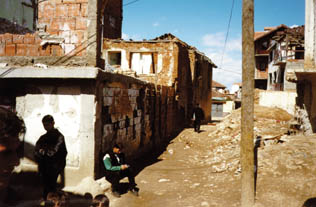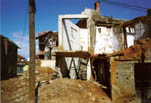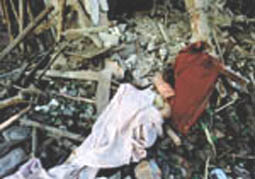Roma under NATO Bombs Roma were among the victims of NATO's offensive everywhere in Yugoslavia, including Kosovo. They were shattered by bombs and torn apart by fragmentation grenades like many others whom the Alliance wasclaiming to save, even fleeing Albanians in trucks and busses. The destruction of living quarters, hospitals, schools, power stations and plants where Roma lived and were employed was no less disastrous than elsewhere. Does one have to be happy that the surviving Roma refugees, who had to leave, now at least do not have to suffer the environmental consequences of the war? According to UNHCR/OSZE, Roma were also victims of the Serbian militia when they helped their Albanian neighbours. Thousands of Roma fled along with the Albanians during the war. Numerous Roma, who were serving in the army of Yugoslavia or who worked for the police, deserted. On 14 April 1999, the Serbian militia forced one thousand Roma occupants of the quarter "Fabricka" in Mitrovica into the sports hall "Topola". This action was taken because the Serbian militia suspected the Roma of hiding Albanians who had fled from their homes nearby. The Roma Quarter "Yeni Mahalle" in Prizren is hit by cruise missiles on 28 April 1999. The Roma family Zulifuri is killed: Maksum (2 years), Kasandra (3 years), mother Dulja (24 years) and father Becir (25 years). Twenty-six Roma die in two NATO attacks on Prizren; 12 homes are destroyed and 10 others are damaged. There has been no compensation. Photos: Herbert Heuß
Roma woman who was killed in her bed by NATO bombs in Ripanj near Belgrade, May 1999. Photo: V. Savatic
Roma as Collaborators?
After their return, the Albanians who had been tormented by Serbian soldiers were looking for revenge. But the Serbs had flown or were heavily armed. And so the Roma and other non-Albanian minorities had to serve as scapegoats and were accused by the UCK (KLA) of having collaborated with the Serbs. Cedda Prlincevic, head of the Jewish community in Pristina, who himself was robbed of his possessions and driven out, says about this accusation, "To them everybody was a collaborator who was against the secession, no matter if they were Serbs, Roma, Gorans, we Jews and even Albanians." And the Roma/Ashkali especially have always stood in the crossfire. In order to protect
their families andto secure their jobs, a father may have been a member of the Serbian Socialist Party (SPS) of Milosevic and his son a member of Rugova´s LDK. But there have also been convinced pro-Belgrade party members as well, the best known being Luan Koka, who served as a delegate at Rambouillet. Othersnostalgically held on to the multicultural idea of the old Yugoslavia of Tito- against all Albanian and Serbian nationalists. But many Roma/Ashkali who were socialised as Muslim and Albanian identified with the Albanians. They participated in the Kosovo Albanian shadow society and suffered repression by Serbian officials. Others supported the UCK (KLA) financially or even as fighters. The Rom e.V. has contact with one Roma from Pec who served in the UCK (KLA) as a MIP-officer (Morale, Information, Politics)
during the war. Now he is a refugee. The rumour of "the Roma" having participated in war crimes emerged after Roma employees at public graveyards were forced by the militia to bury victims of massacres. Roma representatives have demanded for a long time that any Roma who took part in the plundering of abandoned Albanian and Roma houses with Serbian and Albanian (!) gangs be punished severely. At the war crimes tribunal in the Hague, no Roma is being investigated. In Mitrovica, three Roma are being accused of war crimes by the UCK (KLA) commander of Urosevac. Although the UN police had to drop investigations due to lack of evidence, the three are going to be taken to court in Mitrovica. Up to now, not a single participant or organiser of the UCK (KLA) pogroms has been sentenced.


